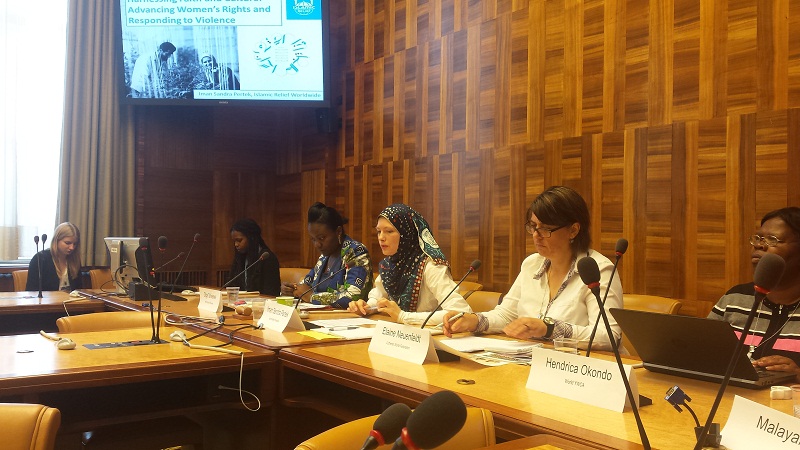The views of faith-based organisations on violence against women and girls (VAWG) have been given prominence at the United Nations’ debate on domestic violence and early and forced marriage.
Islamic Relief Worldwide co-organised event Harnessing Faith and Culture: Advancing Women’s Rights and Responding to Violence at the premises of the 29th Session of the UN’s Human Rights Council.

Together with the Lutheran World Federation, the World Council of Churches and World YMCA, Islamic Relief Worldwide explained how faith-based organisations can often present practical examples to VAWG problems as they engage with communities on issues of justice.
Islamic Relief has been working with faith leaders on dismantling myths and religious and cultural misinterpretations that support the oppression of women, girls, men and boys, with particular focus on issues such as reproductive health, inheritance rights, economic rights, access to health care, early and forced marriage, and domestic violence.
Iman Sandra Pertek, senior policy advisor on gender for Islamic Relief Worldwide, said that gender stereotypes were not justified by religion and were even challenged by religious texts.
Unconditional equality
“The principles at the core of our work for gender justice and women’s rights are based on the Quran and the traditions of the Prophets. While the religious narrative indicates unconditional equality, the human approach to the religious texts often fails to attain this all-encompassing justice. In front of God, women and men are equal.”
The panel, at the event held in Geneva on June 16, also consisted of Olga Tshiwewe of World YMCA, Malayah Harper of UNAIDS, Hendrica Okondo of World Council of Churches, and moderator Elaine Meuenfeldt of the Lutheran World Federation.
Olga Tshiwewe talked about physical and sexual violence of women, and shared the story of Stella, who aged 17, was forced to leave school and marry a man double her age, yet the community and church remained silent rather than intervening on her behalf.
Malayah Harper, from UN Aids, argued that the lives of many women had not really improved despite the Millennium Development Goals, and that politics, economics and culture of a community are often the cause of gender-based violence. Religious institutions, she argued, had a role to play in changing these socially accepted harmful practices.
Together, the representatives released a Joint Statement to the President of UN Human Rights Council, outlining their position and requesting space for interfaith cooperation in the promotion of human rights, and to consider faith communities as integral partners in the protection and promotion of human rights of all people, including in the prevention and elimination of violence against females.
Islamic Relief recently launched its global gender policy, outlining its commitments for the future. They range from increasing protection and accountability measures for women and children in humanitarian response to addressing gender inequalities through the promotion of knowledge.










